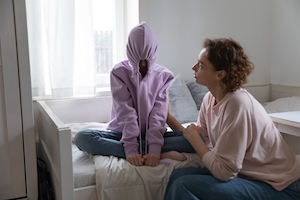 A new study published in the Journal of Child Development looked at the how perceived psychological control in early adolescence predicts lower levels of adaptation into mid-adulthood.
A new study published in the Journal of Child Development looked at the how perceived psychological control in early adolescence predicts lower levels of adaptation into mid-adulthood.
“We were hoping to understand the long-term associations with overly controlling parenting in adolescence,” Emily Loeb, Research Associate at the University of Virginia and one of the authors of the study told us. “In particular, we wanted to see how adolescents who experienced psychological control (where parents' love and acceptance is contingent upon the adolescent conforming with the parents' wishes) did in adulthood in terms of educational attainment and romantic relationships.”
Previous work has found shorter-term negative associations with psychological control, such as poorer academic performance, self-esteem, and identity development. Researchers suspected that early experiences of psychological control might set in motion a chain of behaviors and experiences that would last into adulthood.
“Right now, the amount of control that parents should have over their kids is a hot issue,” Loeb told us. “We wanted to highlight one way of controlling teens that is extremely problematic, so that, hopefully, fewer adults try this tactic (even though it may have been used on them).”
Researchers used a diverse sample of 184 7th and 8th graders and followed them from ages 13 to 32. They collected interviews, videos of them interacting with friends and, later, romantic partners, gathered educational records, and surveyed teens at their school about how much they would like to spend time with our target adolescents.
“We found that teens whose parents used more psychological control developed less supportive romantic relationships by age 27 and were less likely to be in a relationship at all by age 32,” Loeb told us. “In addition, these teens went on to achieve less education by age 32.
The study also found that these teens were struggling at ages 15 and 16, in terms of being liked by peers and being able to think about social situations in a nuanced way. The problems in mid-adolescence helped explain the long-term findings from 13 to adulthood.
“We were surprised by how long-term the effects lasted,” Loeb told us. “Because having a romantic partner at age 32 is very common, I was surprised to see that psychological control in adolescence predicted a lower likelihood of being in a romantic relationship by that age.”
Loeb explained that she and her team want to distinguish this work from behavioral control, which involves having rules and structure for kids as they believe that kind of control is important. Psychological control is a specific way of trying to gain control: Doing such things as refusing to look at your child if they've upset you, reminding them of all the things you've done for them, telling them how much it hurts you when they don't do what you want, etc.
“This kind of control seems like it may get into kids' heads and stunt their ability to think for themselves and take initiative, because stepping outside the lines might be emotionally dangerous,” Loeb told us. “We hope that parents and other adults working with teens understand that allowing teens to express different opinions and ways of acting is important for adolescents to grow into an autonomous adult.”
Patricia Tomasi is a mom, maternal mental health advocate, journalist, and speaker. She writes regularly for the Huffington Post Canada, focusing primarily on maternal mental health after suffering from severe postpartum anxiety twice. You can find her Huffington Post biography here. Patricia is also a Patient Expert Advisor for the North American-based, Maternal Mental Health Research Collective and is the founder of the online peer support group - Facebook Postpartum Depression & Anxiety Support Group - with over 1500 members worldwide. Blog: www.patriciatomasiblog.wordpress.com
Email: tomasi.patricia@gmail.com